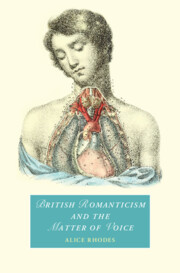Book contents
- British Romanticism and the Matter of Voice
- Cambridge Studies in Romanticism
- British Romanticism and the Matter of Voice
- Copyright page
- Dedication
- Contents
- Acknowledgements
- Introduction
- Chapter 1 Erasmus Darwin and the Mechanics of Speech
- Chapter 2 John Thelwall and the Physiology of Speech
- Chapter 3 Percy Bysshe Shelley and the Poetry of Speech
- Coda
- Notes
- Bibliography
- Index
- Cambridge Studies In Romanticism
- References
Bibliography
Published online by Cambridge University Press: 16 January 2025
- British Romanticism and the Matter of Voice
- Cambridge Studies in Romanticism
- British Romanticism and the Matter of Voice
- Copyright page
- Dedication
- Contents
- Acknowledgements
- Introduction
- Chapter 1 Erasmus Darwin and the Mechanics of Speech
- Chapter 2 John Thelwall and the Physiology of Speech
- Chapter 3 Percy Bysshe Shelley and the Poetry of Speech
- Coda
- Notes
- Bibliography
- Index
- Cambridge Studies In Romanticism
- References
- Type
- Chapter
- Information
- British Romanticism and the Matter of Voice , pp. 178 - 190Publisher: Cambridge University PressPrint publication year: 2025

